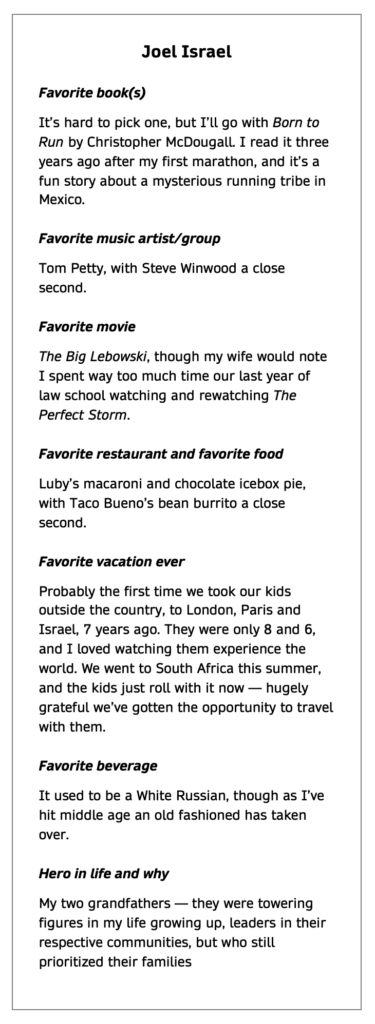
Joel Israel
Frederick Beatty sued PHH Mortgage in 2019 claiming breach of contract, interference with the reinstatement of his mortgage, wrongful foreclosure and a fraudulent business transaction.
Beatty accused PHH of interfering with his ability to pay the past due amount on his mortgage for his home in Petaluma, California, which would have allowed him to reinstate his loan and to avoid foreclosure. He claimed the illegal actions of the financial giant cost him his home, ruined his credit and inflicted severe financial loss. Hundreds of thousands of dollars in damages were sought.
In June 2020, the case file landed on the desk of Joel Israel, assistant general counsel at Ocwen Financial Corporation. PHH is an Ocwen subsidiary.
“Our single-plaintiff cases typically involve our customers who many times are experiencing some form of financial distress that puts them at risk of losing their house,” Israel said. “I try to foster a compassionate approach where the situation merits it and where we can work toward a proactive solution for the borrower that keeps them in the home when they can afford it.
“Unfortunately, sometimes that’s not possible,” he said.
Premium Subscribers: CLICK HERE for Joel Israel’s Q&A with TLB founder Mark Curriden.
Israel looked through the Beatty case file, like he had hundreds of others. The facts here were different. They reeked of abuse. He claimed emotional distress and pain and suffering in his lawsuit, but his Facebook page showed him enjoying Rio de Janeiro. Any thoughts about seeking a quick, easy settlement immediately evaporated.
“There are plaintiff lawyers we see a lot who want quick, five-figure settlements, but there are some cases we need to fight on principle, to make a statement,” Israel said.
In early 2022, a federal court decision granting PHH a full victory on summary judgment circulated among plaintiffs’ lawyers in California with a message: If you sue PHH and Ocwen and you have bad facts, you will lose. The days of fast nuisance settlements on mortgage foreclosures is past.
Pointing out that the best courtroom victories do not always occur in bet-the-company litigation, a panel of three judges has named Israel, Ocwen and its outside counsel at Womble Bond Dickinson as a finalist for the 2022 DFW Corporate Counsel Award for Business Litigation of the Year.
The Association of Corporate Counsel’s DFW Chapter and The Texas Lawbook will honor all finalists and announce the winners at a ceremony at the George W. Bush Institute on Jan. 26. The Business Litigation of the Year Award is one of three honors that recognizes the in-house counsel and their outside lawyers for their joint success.
“Joel is intelligent and intuitive,” said Womble partner Kristin Walker-Probst, who handled the Beatty case with Israel. “As an in-house counsel, he is able to effectively manage a heavy case load this way. Having worked with Joel on escalated matters for years, he also is clearly in touch with the practical implications of a sympathetic plaintiff and what a jury might do.
“He is not afraid to try a case, if needed,” Walker-Probst said. “More often than not, Joel has already researched opposing counsel, the judge and reviewed some of the rulings. Although smart and decisive, Joel communicates with humility and grace, even with some of the younger or less experienced attorneys and staff. Joel epitomizes the word ‘partnership’ in the relationship between in-house and outside counsel.”
Ocwen Deputy General Counsel Eric Spett said Israel has an ability to “see the big picture and understand what a ‘win’ looks like to the client.”
“This is not always easy, especially for lawyers who have spent time in big law firms,” Spett said. “We often have multiple clients whose wishes and needs may often be at odds. We have to consider costs. And when you have dozens or more lawsuits you’re defending at any given time, you have to think about how arguments you make in one case will impact all the other cases with similar facts or claims.
“It’s a juggling act, and Joel has demonstrated, time and again, he knows how to keep all these balls in the air,” he said. “Joel’s level-headedness allows him to handle any challenge or crisis that comes his way. Nothing is too big for him.”
Locke Lord partner Rob Mowrey, who is currently working with Israel on a litigation matter, said Ocwen is “truly blessed” to have Israel working in-house.
“Joel is the gold standard,” Mowrey said. “Even with all the pressures from the business side, Joel still remembers what it is like to practice law and litigate cases. He digs into his cases and is not superficial in anyway.”
Israel oversees about 500 mortgage foreclosure-related lawsuits annually that usually seek tens-of-thousands to hundreds-of-thousands of dollars in damages. Sometimes, the claims will hit seven figures.

That being said, Israel has significant experience in highly complex, global litigation in which billions of dollars are at stake.
For eight years, Israel worked side-by-side with Dallas trial lawyer Mark Werbner to achieve a landmark jury verdict against the Arab Bank of Jordan for its role in supporting terrorists.
“Joel is a great lawyer,” Werbner said. “I was disappointed to see him go in-house instead of becoming a trial lawyer, but I am incredibly proud of Joel. He deserves to be recognized.”
Israel is a fourth-generation Dallasite. His mother’s family immigrated from Poland through Galveston starting in 1892. His father’s family “took the more traditional path through Ellis Island.” They came between 1908 and 1912 from Elizabethgrad, which was then part of Russia.
“It’s in the distant past, but those journeys still definitely shape my view of the world,” he said. “I grew up with all four grandparents within a 10-minute drive up. That nurturing environment was the biggest gift of my childhood.”
Israel’s mother was a school teacher and active in their synagogue. His father, Steve Israel, was a reporter for 10 years – 1970-1980 – at the Dallas Times Herald. He covered trials and fires and anything happening on the streets of Dallas. But the job also required him to be away from his family more than he liked. So, he quit to be a technical writer for several large companies so that he could be home with his family more.
There were several lawyers in Israel’s family. The two who had the biggest impact on his career choices were his grandfather, Esir Tobolowsky, and his aunt, Peggy Tobolowsky. His grandfather earned his law degree from Southern Methodist University when he was 20 and had a solo general practice handling all kinds of matters for more than five decades. His aunt was a federal prosecutor and then a partner at Akin Gump. She also joined the faculty at the University of North Texas, where she taught criminal justice for 30 years.
“The common thread with both was the idea of law as service to individuals and the community,” said Israel, who noted that Dallas District Judge Emily Tobolowsky is a fourth cousin.
Israel said he “ignored my family’s history in the law” by majoring in psychology in college and thinking about following his sister into social work. But he took a college course during his junior year at Duke University that changed his mind.
“We actually had to spend time with psychologists and social workers in the area, and that’s when I realized, this definitely wasn’t for me,” he said.
A few weeks later, Israel was sitting on a grass hill watching a Duke baseball game with a friend who was a first-year law student at Vanderbilt University. The friend shared his law school experience.
“It all kind of came together then — the reality that law still could be service-oriented, but was just a better fit for my personality,” he said. “I never really looked back after that.”
After graduating from Duke University School of Law in 2003, Israel spent three years in Big Law — first with Paul Hastings in Los Angeles and then Latham & Watkins in Washington, D.C.
In the summer of 2006, Israel and his wife were interested in moving back to Dallas to start a family.
“In making that move, I was pretty sure I wanted to transition away from Big Law so I could get more hands-on litigation experience to see if it’s what I really wanted to do for another 30 years,” he said.
Israel’s aunt connected him with Mark Werbner. He said the nine years he spent at Sayles Werbner were extraordinary.
“Joel was successful in every task or endeavor he ever undertook,” said Dick Sayles, now a partner at the Bradley law firm in Dallas. “Joel is very smart, and he is diligent and thoughtful — the basics of a good lawyer. Joel is an even better person — one of the most thoughtful, considerate, kind persons I have ever known.”
Not long after Israel joined Sayles Werbner in August 2006, he was assigned to work on the Arab Bank litigation. The firm represented the families of 100 U.S. residents who were murdered or seriously injured by suicide bombers as part of the Second Intifada, a Palestinian uprising between 2000 and 2004.
The lawsuit, filed under the federal Anti-Terrorism Act by Werbner in 2004, accused Jordan-based Arab Bank of providing material support to Hamas and other U.S.-designated terrorist groups.
“The work took me around the world, with about six-months of travel to the Middle East and Europe for depositions and investigations and 15 to 20 trips to New York for hearings and discovery,” Israel said. “I got to know some of the families very well, including several who 10-15 years later still understandably grappled with the deaths of parents and children or with their own injuries, and still keep in touch with a few of them.”
The litigation led to a seven-week liability trial in the Eastern District of New York where a jury in September 2014 unanimously ruled for victims of 24 separate terrorist attacks that happened in Israel from 2001-2004.
Arab Bank later settled for a confidential sum of payments to the victims. The case earned Public Justice’s Trial Lawyer of the Year Award for the trial team.

“Thanks to Mark’s confidence in me, I really got to experience every aspect of the case, and the decision to leave private practice was made much easier by the experience and the trial in particular,” Israel said. “It felt like a once-in-a-lifetime case.”
As the Arab Bank case winded down, Israel started thinking about going in-house, which he saw as a “natural progression” for his career that would allow him to spend more time with his family.
In early May 2015, he saw the LinkedIn listing for a job.
“My reaction was, ‘Not sure I’ve heard of Ocwen, and hope they don’t mind my lack of mortgage servicing experience, but this job sure seems like a good match.’”
“I knew a lot less about what it would be like to work in-house than I thought I did, and I was naïve in some ways, but I got a little lucky as the first major case I worked on was a natural fit for my background,” he said.
On his third day on the job at Ocwen, Israel was assigned a major qui tam lawsuit.
“The first year I spent working on it really introduced me to every facet of the company and quickly exposed me to the stark differences in managing litigation from the inside versus the outside,” he said. “For a company like Ocwen, which isn’t small but also isn’t one of the biggest banks, the C-suite is more accessible, and due to this case I had early interaction with leaders from the CEO down through just about every rung of the org chart.”
“I learned about the company’s software systems, customer case operations, merger history and how the company ran its mortgage servicing business,” he said. “Just as importantly, I learned about the fundamentals of managing litigation in-house — working internally with employees, effectively trying to manage costs, communicating both up the law department chain and with business leaders, and most critically, how to use my background to confidently exercise good judgment.”
The Beatty litigation came to Israel’s attention in June 2020.
In most mortgage default cases, in-house lawyers at banks simply give the complaints a glance and forward to outside counsel to negotiate a settlement. But specific facts caught Israel’s eye as unusual.
Between 2010 and 2018, Beatty defaulted on his mortgage five times. In 2017, he was so late on his payments that the property went into foreclosure and sold to a third party. But Beatty paid the necessary amount the day before the sale. As a result, Ocwen reinstated his loan and rescinded the sale.
In August 2018, Beatty again defaulted on his loan. A new foreclosure sale was scheduled. Again, Beatty paid up and reinstated his loan the day before the foreclosure sale. And a month later, court records show that it happened again.
Then came the summer of 2019. Beatty was once again behind on payments. This time for $29,498.35. A notice of trustee’s sale was recorded.
“This didn’t appear to be a typical fact pattern or borrower, and the case was brought by a lawyer we used to see somewhat regularly, so I couldn’t justify a settlement,” he said. “The case seemed in need of a fresh strategy.”
Israel turned to Walker-Probst, a Los Angeles lawyer who had become one of Israel’s go-to outside counsel on the West Coast when “dealing with some difficult and unique fact patterns in cases that seemed less likely to settle and more likely to get to trial.”
Israel and Walker-Probst “really set out to change the course of the case, both through a fresh review of the file and effective depositions, but also by taking advantage of other tools.”
They turned to Beatty’s social media posts.
“His self-told life story really contradicted a lot of what he was alleging in the lawsuit,” Israel said. “It’s not so much that what we found turned the merits in our favor, but it undermined the plaintiff’s credibility and damages claims, and gave me confidence that if we tried the case, we had a good chance to win.”
The new strategy was a success, as the U.S. District Court in the Northern District of California dismissed the case in early 2022 after granting a slam dunk victory on summary judgment.
In a 21-page ruling (Frederick James Beatty v. PHH Mortgage Corporation, Case No. 19-cv-05145), U.S. Magistrate Judge Donna Ryu found that “Beatty does not put forth any evidence that he suffered damage to his credit score” and that “the record does not support Beatty’s argument” that PHH’s actions led to his divorce.
Judge Ryu cited PHH’s call logs showing that Beatty admitted to being on vacation in Rio de Janeiro at a time he claimed financial hardship and emotional distress from the foreclosure of his property.
“In light of Beatty’s conflicting testimony, the court finds that Beatty failed to support his claims of harm with any degree of certainty,” Judge Ryu wrote. “Beatty fails to establish that he is entitled to any of his requested remedies.”
As the Beatty litigation was winding down, Israel and Walker-Probst faced a separate but similar case set for a bench trial in the Superior Court of Los Angeles.
Delia Castanon, an individual borrower who defaulted on her mortgage, and who initially was denied for a loan modification after not disclosing that her home-owners association already had foreclosed on her property, sued Ocwen Loan Servicing in 2016.
Israel took over the case after Ocwen’s summary judgment motion had been denied and a trial date was scheduled.
“I was given a pessimistic view of the case, but in reviewing the file, the claims looked complex but defensible,” he said. “We also were facing an opposing counsel who had sued us routinely in the past and generally tried to stretch discovery as much as possible.”
“Those realities, along with the venue, suggested I needed a trial lawyer who I could work with to break down the complexities and be able to explain in plain language at trial why Ocwen just wasn’t responsible for the misfortunes in the borrower’s life,” he said.
Israel once again turned to Walker-Probst.
The case went to trial as 2021 came to an end. Israel joined Walker-Probst in court for the weeklong trial.
“Starting with our opening, we were focused on how to make the presentation as digestible as possible, while keeping the facts tethered to the law,” Israel said. “The latter isn’t always top of mind, and in private practice I was part of a team that won a trial but then lost on appeal because the story got disconnected from the elements we needed to preserve the win.”
Israel and Walker-Probst found the right balance.
“This case exemplified the most delicate balance we often face — the reality of defending claims brought by someone who’s going through difficulties and who’s subject to losing their house as a result, but for whom our company has tried to do everything we can to keep them in their home,” Israel said.
On April 5, 2022, California Superior Court Judge Raul Sahagun gave Ocwen a complete victory.
Walker-Probst said Israel is unassuming and compassionate, but also not afraid to go to trial.
“Joel has successfully transitioned through significant restructuring at Ocwen as it downsized and reorganized,” she said. “All the while, he had to manage an enormous caseload, a number of employees, including in India, and his outside counsel. His results were impressive — but the manner in which he did it, was perhaps more impressive.”
